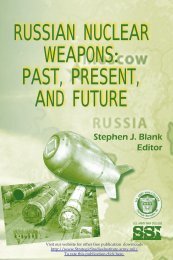The United States and China in Power Transition - Strategic Studies ...
The United States and China in Power Transition - Strategic Studies ...
The United States and China in Power Transition - Strategic Studies ...
You also want an ePaper? Increase the reach of your titles
YUMPU automatically turns print PDFs into web optimized ePapers that Google loves.
mentation does not require a war with the <strong>United</strong><br />
<strong>States</strong> or the destruction of the U.S.-led <strong>in</strong>ternational<br />
system.<br />
F<strong>in</strong>ally, the power transition theory po<strong>in</strong>ts out that<br />
“a wise challenger, grow<strong>in</strong>g <strong>in</strong> power through <strong>in</strong>ternal<br />
development, would wait to threaten the exist<strong>in</strong>g <strong>in</strong>ternational<br />
order until it was as powerful as the dom<strong>in</strong>ant<br />
nation <strong>and</strong> its allies, for surely it would seem<br />
foolish to attack while weaker than the enemy.” 20 A recent<br />
excellent analysis of the power transition theory<br />
re<strong>in</strong>forces this view by show<strong>in</strong>g conv<strong>in</strong>c<strong>in</strong>gly that the<br />
upstart, believ<strong>in</strong>g its development would eventually<br />
turn it <strong>in</strong>to the “top dog” among the great powers,<br />
would try to avoid premature confrontation, even as<br />
it approaches parity, with the hegemon. 21 It is more<br />
logical, <strong>and</strong> empirically evident, that the dom<strong>in</strong>ant<br />
power rather than the upstart is more likely to <strong>in</strong>itiate<br />
a fight. This is clearly the case with <strong>Ch<strong>in</strong>a</strong>, whose<br />
leaders have sworn to use strategy rather than force to<br />
w<strong>in</strong> the contest.<br />
In addition, as two well-established nuclear powers<br />
<strong>and</strong> extensively-connected economic growth eng<strong>in</strong>es,<br />
a calculated war between the <strong>United</strong> <strong>States</strong> <strong>and</strong><br />
<strong>Ch<strong>in</strong>a</strong> is unth<strong>in</strong>kable (even Mearsheimer has to accept<br />
this). Thus, with the <strong>United</strong> <strong>States</strong> expected to uphold<br />
its military superiority well <strong>in</strong>to the mid-century, the<br />
possibility of <strong>Ch<strong>in</strong>a</strong> us<strong>in</strong>g force to change the world<br />
(replac<strong>in</strong>g the U.S. presence everywhere) is highly<br />
unlikely. Deadly contest for change is not an option<br />
for <strong>Ch<strong>in</strong>a</strong>. <strong>The</strong> risk of war between the <strong>United</strong> <strong>States</strong><br />
<strong>and</strong> <strong>Ch<strong>in</strong>a</strong> will be more likely a miscalculated or unwanted<br />
fight over <strong>Ch<strong>in</strong>a</strong>’s unsettled problems <strong>in</strong> the<br />
Western Pacific (more discussion of this aspect <strong>in</strong> the<br />
follow<strong>in</strong>g pages).<br />
84

















